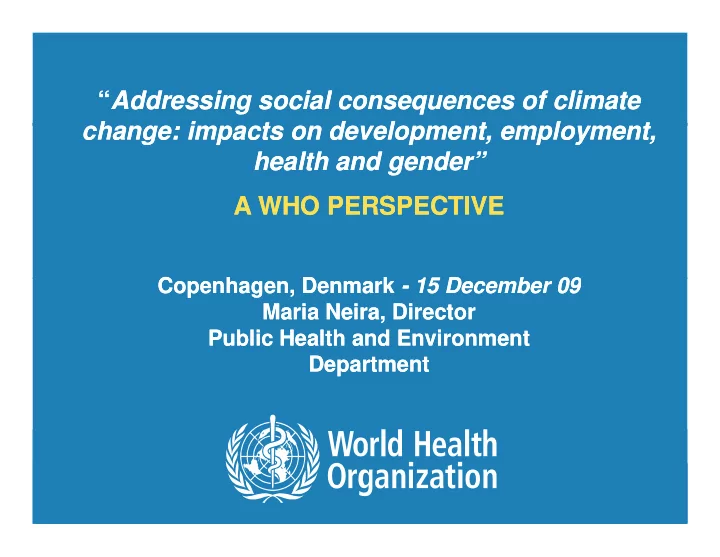

“ Addressing social consequences of climate “ Addressing social consequences of climate change: impacts on development, employment, change: impacts on development, employment, health and gender” health and gender” A WHO PERSPECTIVE A WHO PERSPECTIVE Copenhagen, Denmark - 15 December 09 Copenhagen, Denmark - 15 December 09 Copenhagen, Denmark - 15 December 09 Copenhagen, Denmark - 15 December 09 Maria Neira, Director Maria Neira, Director Public Health and Environment Public Health and Environment Department Department � | Climate Change and the health of workers
Climate change is "our" business “ Whoever wishes to investigate medicine properly, should proceed thus: in the first place to consider the seasons of the year, and what effects each of them produces for they are not at all alike, but differ much from themselves in regard to their changes. Then the winds, the hot and the cold, especially such as hot and the cold, especially such as are common to all countries, and then such as are peculiar to each locality ” On Airs, Waters and Places. Hippocrates (Circa 400 B.C) � | Climate Change and the health of workers
The health effects of climate change The health effects of climate change HEALTH EFFECTS • Temperature-related illness and death • Extreme weather- related health effects CLIMATE • Air pollution-related health effects • Air pollution-related health effects CHANGE CHANGE • Water and food-borne diseases • Vector-borne and rodent- borne diseases • Effects of food and water shortages • Effects of population displacement Based on Patz et al, 2000 � | Climate Change and the health of workers
Indirect effects Major disease burdens are climate sensitive Each year: - Undernutrition kills 3.5 million - Diarrhoea kills 2.2 million - Malaria kills 900,000 - Malaria kills 900,000 Each of these is highly sensitive to temperature and precipitation � | Climate Change and the health of workers
Climate change is already affecting health globally Cumulative emissions of greenhouse gases, to 2002 WHO estimates of per capita mortality from climate change, 2000 � | Climate Change and the health of workers Map projections from Patz et al, Ecohealth 2007.
Examples of health impacts Climate Change and Health: Warming Salmonella; mosquitoes (malaria, Paths, Examples dengue) heat-stress at work Humidity Food yields: nutrition Meteorological Rainfall/drying conditions, Extreme events Injury/death; infection outbreak; depression exposures and stress disorders Impacts, via: Displacement Slums/shanties, emigration: many hlth risks Human/social (e.g. sea-level rise) consequences Shifts in farming Land-clearing � new microbe contacts of climate change change Malnutrition Malnutrition Stunting; infection susceptibility Stunting; infection susceptibility Climate change Hydropower : snails and Schistosomiasis Alternative energy Clean air: cardio-resp. diseases Mitigation Transport choices Physical activity actions Livestock production Diet/health impacts Responses (excess red meat � colon cancer) (esp. ruminants & methane) Adaptation Crop substitution Unexpected nutrient deficiencies actions Water tanks � mosquitoes Water shortage
Climate Change and the health of workers
CC impacts on workers' health CC impacts on workers' health Climate related change Health effects on workers Occupations/sectors Increased ambient Heat stress/stroke Farm and construction temperature workers Decreased chemical tolerance Air pollution Asthma Outdoor workers in cities Allergens Allergens UV radiation Skin and eye cancer Sea platforms, outdoor workers cataract Vectors' expanded habitats Pathogens, allergens, Agriculture, forestry, oil plants, insects, animals and gas, Changes in built Tight buildings, radon, sick Office workers environment building syndrome, legionellosis Adapted from Schoulte & Chun, 2009 � | Climate Change and the health of workers
Some health benefits of climate mitigation strategies Some health benefits of climate mitigation strategies � Renewable energy: – Eliminate diseases and injuries from fossil fuel extraction – silicosis, black lung, mine explosions – Improved occupational health profile of renewable technologies � Organic farming: � Organic farming: – Reduction in pesticide poisonings and chronic effects � Sustainable transport: – Reduced air pollution – Increased physical activity � | Climate Change and the health of workers
Occupational health challenges of climate mitigation Occupational health challenges of climate mitigation � Exposure to mercury in the production of fluorescent light bulbs � Exposure to asbestos during retrofitting of buildings � Occupational health risks in recycling industry �� | Climate Change and the health of workers
Workers' health in the green economy Workers' health in the green economy � Comparative assessment of conventional vs. green technologies – from cradle to grave � Prevention through design – technologies, buildings � Green jobs: � Green jobs: – a green job should not be dangerous to health – occupational health benefits vs. risks in job creation �� | Climate Change and the health of workers
Policy response Policy response � Incorporate workers' health in adaptation and mitigation strategies – prevention of heat stress – occupational exposure to disease vectors – sick building syndrome � Regulate the assessment of occupational health impacts of green technologies across borders �� | Climate Change and the health of workers
Conclusions Conclusions � Besides environmental and economic damage, the ultimate impact of climate change represents a toll on our most precious resource - human lives and health. � Significant co-benefits for population health and well- being can result from mitigation policies in sectors such being can result from mitigation policies in sectors such as energy, transport and agriculture. � The health sector will bear most of the burden resulting from the impacts of climate change on populations and it will play a critical role in relation to adaptation and resilience. �� | Climate Change and the health of workers
Conclusions (ii) Conclusions (ii) Health in the COP15 negotiations � Recognition of the human face of climate change � Health sector access to financial resources and � Health sector access to financial resources and technologies to enhance adaptation and resilience of populations � Health co-benefit as a criterion for mitigation policies �� | Climate Change and the health of workers
Recommend
More recommend